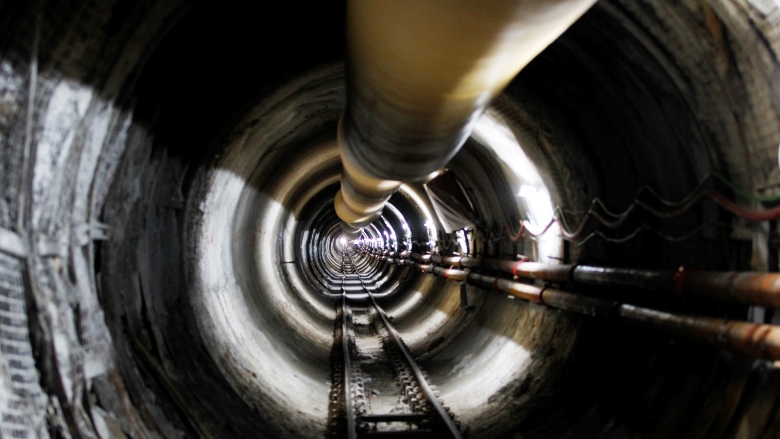by naharnet – President Michel Aoun has stressed that Hizbullah’s weapons “do not contradict with the State,” noting that it is “more than guaranteed” that Hizbullah will not “turn its arms inwards.” “As long as there is Israeli-occupied land and as long as the army is not strong enough to fight Israel, we sense that […]

The National – Robin Mills
Snow fell across Lebanon over the New Year, and power cuts
plunged towns in the Bekaa valley into darkness. Syrian refugees in
Akkar huddled in their tents. Meanwhile, as Egypt and Israel forge ahead
with developing their offshore gasfields, the inviting Mediterranean
waters seem to hold the elusive solution to the country’s energy and
economic woes. Lebanon thinks the time has come for its own
deepwater gas wealth. The election in October of a new president, Michel
Aoun, after an interregnum of more than two years, has permitted the
passage of two crucial decrees enabling exploration bids. Eni’s giant
Zohr find off Egypt, less than 300 kilometres from Lebanese waters, has
raised optimism about the area.
Beirut
has divided its offshore into 10 blocks. Five will be offered in the
initial round, with a deadline in September – numbers 8, 9 and 10, along
the disputed maritime border with Israel, block 1 on the Syrian
frontier in the north, and block 4 in the middle. The bidding
conditions are stringent. Applicants to lead a consortium have to have
US$10 billion of assets and to operate at least one deepwater petroleum
project. Qualification for a lesser role requires US$500 million of
assets and established oil or gas production. Companies
that qualified for the last, abortive round in 2011 include some
impressive contenders – Shell, ExxonMobil, Chevron, Statoil, Total, Eni
and others. Qualified non-operators featured the UAE’s Dragon Oil,
Crescent and Dana Gas alongside a slew of local, Japanese, Russian,
Turkish and other companies. But Lebanon’s ambitions face three serious problems: low oil and gas prices; politics; and the difficulty of marketing gas.

BEIRUT
(Reuters) – The Lebanese Hezbollah movement strongly supports the
Syrian ceasefire agreed on in Kazakhstan and any truce that could lead
to a political solution, its leader Sayyed Hassan Nasrallah said on
Sunday. Moscow and Ankara brokered a shaky ceasefire in December between the Syrian government and rebel groups opposed to President Bashar al-Assad. The
agreement led to indirect talks last month in the Kazakh capital of
Astana, where Russia, Turkey and Iran agreed to monitor the fragile
truce. Several
senior Hezbollah commanders and hundreds of fighters have died in
Syria, where the Shi’ite Iranian-backed group is fighting in support of
Assad.
“Hezbollah
strongly supports, not just the Astana ceasefire, any ceasefire agreed
upon in Syria,” Nasrallah said, in order “to prevent bloodshed and pave
the way for political solutions”. Nasrallah said the battle in Aleppo city had changed the path of the Syrian conflict, now in its sixth year. Syrian
government forces, helped by Russian air power and Iranian-backed
militia, drove rebel groups out of east Aleppo in December, in Assad’s
most important gain of the war. “For
six years, Syria faced the risk of the collapse of the state,”
Nasrallah said in a televised speech. “This danger has been mostly
overcome.”

Hamat airport in Lebanon
By Gulf news – Joseph A. Kechichian – Beirut: Lebanese MP Riad Rahal, a member of the Future Movement from
the Akkar region, north of Tripoli, has urged officials to “begin work
to revamp the Qlay‘at Military Airfield into a civilian airport
immediately.” A statement issued on Saturday by The Movement of
Public Opinion in Akkar [MPOA], a new civil society organisation, hailed
the social media campaign as a long overdue initiative. Although
the relatively neglected Akkar region provides Lebanon with a vast pool
of young men who serve in the armed forces, it also houses a key
airfield, the Rene Mouawad Airbase — Qlay‘at, named after the
head-of-state assassinated in 1989, and which hosts a helicopter wing. Officials now want to revitalise the region and, simultaneously, encourage Lebanon to have a second international gateway. In
fact, Qlay‘at offers a strategic alternative to Rafik Hariri
International Airport [RHIA], which is located in Beirut’s southern
suburbs, Dahiyah, and which poses potential security risks as its
perimeter fence is too close to various Hezbollah strongholds.
Over the years, a controversial debate preoccupied the Lebanese to
find an alternative civilian facility — whether at Qlay‘at or the Rayaq
Airbase in the Bekaa Valley — precisely to avoid serious security
breaches at RHIA. The Qlay‘at facility has a 3,600-metre by
60-metre concrete runway and there are warehouses for fuel, areas for
maintenance, spare parts, telecoms devices and radars.

Jared Kushner, second from left, with his
wife, Ivanka Trump, and Stephen K. Bannon, the president’s chief
adviser, at the White House on Friday for a visit by Prime Minister
Shinzo Abe of Japan.
By
When Jared Kushner was 17 years old, he stood where a million Jews had been murdered and listened to Israel’s prime minister stress the country’s importance. “The
Holocaust could have been prevented. We know it could not have taken
place had the Jewish state been established a few years earlier,” the
prime minister, Benjamin Netanyahu,
said in 1998, standing amid the ruins of an Auschwitz-Birkenau
crematory. He had just led Mr. Kushner and thousands of other teenagers
waving Israeli flags in a procession through the camp’s gates and past
the barracks. As part of the commemoration, the group would soon leave Poland and fly to Israel, to complete the journey from slaughter to Zionist rebirth.
Back
then, Mr. Kushner was a high school basketball player, a Billy Joel
fan, a quiz team manager and no one’s guess to become a negotiating
partner with Mr. Netanyahu. But unlike other students on the trip, he
knew the prime minister, who was friendly with his father, a real estate
developer and donor to Israeli causes. Mr. Netanyahu had even stayed at
the Kushners’ home in New Jersey, sleeping in Jared’s bedroom. (The
teenager moved to the basement that night.) On
Wednesday, when the Israeli prime minister visits the White House, Mr.
Netanyahu and Mr. Kushner will reunite on far different terms from
before — and yet their meeting will be imbued with some of the shared
ideas of those old encounters. Mr. Netanyahu is on his second stint as
prime minister; Mr. Kushner, now 36, is President Trump’s son-in-law and
a leading adviser on Middle Eastern affairs with a formidable
assignment. Mr. Trump has said that Mr. Kushner will try to “do peace,”
which the president has called “the ultimate deal.”
Mr.
Kushner, on something of a crash course in diplomacy, has been speaking
with Arab leaders in recent weeks. But he is a mystery to most Middle
Eastern officials. He has no experience in government or international
affairs. His up-close exposure to the Arab world amounts to trips to a
handful of Persian Gulf countries and one star-studded jaunt to Jordan.
Even
though Mr. Kushner has visited Israel since childhood, and more
recently to do business, he is little known there. Though he holds
strong views about the state of Israel, he has not been outspoken about
them, save for editorials in The New York Observer, the newspaper he
owns. His thinking on sensitive matters like settlements is not well
understood. “Israel
wasn’t a political discussion for him; it was his family, his life, his
people,” said Hirschy Zarchi, rabbi at the Chabad House at Harvard,
where Mr. Kushner was an undergraduate.
Rather than diplomatic experience, Mr. Kushner has ties to Israel that are personal and religious. His
visit to Auschwitz was stark, but its themes were not new to him. His
grandmother survived the Holocaust by crawling through a homemade tunnel
in Poland. His grandfather escaped the massacres by hiding in a hole
for years. An Orthodox Jew, Mr. Kushner was instructed to protect
Israel, remember the genocide and assure the survival of the Jewish
people, those close to him say.

By worldbank.org
Lebanon is a small country with a ridge of limestone mountains
close to its coast. Most of its fresh water is stored in mountain
snowcaps or in the ground, the rest of it washing through cracks and
caverns into the sea, feeding the thousands of wells that supply water
to the capital of Beirut and its surrounding areas along the way. Snow was abundant in the past, but more recently climate change has
led to a decrease in the volume of water generally available, especially
in the hot summer months of May to September. Monitoring rainfall is an important part of the work of the Greater Beirut and Mount Lebanon Water Establishment, which manages the water supply of half Lebanon’s population. Its Director-General,
Joseph Nseir, checks on the quantities of snow, water, and rainfall
daily. His worries increase when the quantities fall.
Nseir knows that the only way to secure the water supply is to expand the storage of water and improve the management of it. The World Bank Group supports the Lebanese water sector through
technical assistance and a wide range of operations, including the Water Supply Augmentation Project,
better known as the Bisri Dam. The Lebanese government decided on the
location for the dam after years of studying options, carrying out
social and environmental impact assessments, and gathering feedback from
public consultation.

By Business Insider Lydia Ramsey:
As we age, our brains might start to get less sharp, making it harder to learn new things or remember key events. And for some, that cognitive decline could be significant, in some rarer cases leading to Alzheimer’s Disease. Here’s what the science has to say about the best ways to lower your risk of Alzheimer’s and cognitive decline.
By daily Star Lebanon BEIRUT: Lebanon’s majoritarian parliamentary election system diminishes Druze representation in the country, said Democratic Party leader Talal Arslan Friday. “Druze can only elect two lawmakers out of eight by their votes based on the 1960 [electoral] while the remaining six are elected by our partners from other sects,” Arslan told reporters […]
by AP – BEIRUT — Lebanon’s state news agency says Beirut will file a lawsuit against the suspect behind the New Year’s terror attack in Istanbul that killed 39 people, including three Lebanese citizens. The agency says a Justice Ministry official has been appointed to defend the rights of the Lebanese victims and sue the […]
Reported by Rania Ghanem The total number of visitors reached 1.7 million last year, increasing 11 percent compared to 2015, according to the Ministry of Tourism (MoT). “The country has regained trust after the positive political and security developments,” said Nada Sardouk, Director General at the MoT. Europe was the main source of visitors last […]



